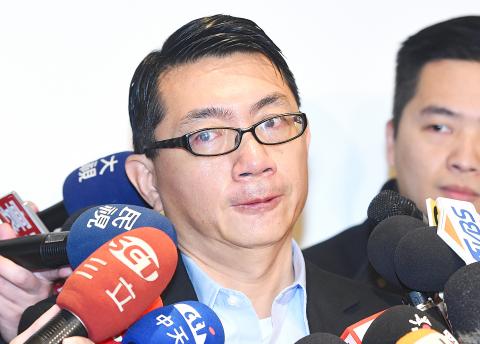All details of charter flights to evacuate Taiwanese in China amid the 2019 novel coronavirus outbreak must be negotiated by Taipei and Beijing, Premier Su Tseng-chang (蘇貞昌) said yesterday, adding that loopholes exposed by a charter flight from Wuhan, China, on Monday must not be exploited again.
Su made the remarks at a weekly Cabinet meeting amid controversy surrounding the flight, which carried three passengers who were not on an approved list, including one who was confirmed to be infected with the virus after the airplane landed, Executive Yuan spokeswoman Kolas Yotaka told a news conference.
Chinese Nationalist Party (KMT) Central Committee member Vincent Hsu (徐正文), who represents a self-help group of Taiwanese in Wuhan, helped arrange the flight.

Photo: Liao Chen-huei, Taipei Times
Control over the situation had been completely lost and such incidents must not be allowed to occur again, Kolas quoted Su as saying.
The premier gave four instructions for evacuation flights, Kolas said.
First, disadvantaged people — including those on short-term business trips, on long-term medication, and the elderly and young — must be given priority for the charter flights, Su said.
Second, the government would demand that its health personnel inspect flights before passengers board to screen for the disease and prevent people from “sneaking” onto the aircraft, he said.
Taiwan would provide first-rate treatment to anyone exhibiting pneumonia-like symptoms after their return, but the government values the health of other passengers as well, he added.
Third, Chinese authorities must provide Taipei with complete lists of passengers for verification, Su said, adding that a last-minute manifest, such as the one provided just before Monday’s charter flight, would not be accepted.
Fourth, charter flights must be arranged on a government-to-government basis, he said, adding that no more intermediaries would be allowed.
Details on the flights must be ironed out by the Straits Exchange Foundation and the Association for Relations Across the Taiwan Straits or higher-ranking agencies, Su said.
Any intermediary attempting to speak for the government in an attempt to win praise would not be welcome, he added.
Local media yesterday reported that a Taiwanese minor with hemophilia was left stranded in Wuhan after they were “negotiated” off the list of passengers at the last minute.
The child has reportedly run out of medicine and might only survive until about Monday.
Asked about the government’s response, the Mainland Affairs Council said that the child would be given priority if there is a second evacuation flight and that it was arranging for Taiwanese businesspeople to deliver the needed medication.
Separately yesterday, the KMT said that it would suspend Hsu’s membership.
Hsu was not part of a seven-member group that helped negotiate the charter flight to evacuate Taiwanese, it said in a statement.
Without the party’s authorization, he held several news conferences and spoke to reporters about the outbreak, it said.
In addition to “creating panic,” Hsu “disrupted and hindered” efforts by the government and other groups to cooperate on fighting the outbreak, it added.
Hsu’s behavior “severely damaged the party’s image and reputation,” the statement said.
After consulting members of the KMT Disciplinary Committee, the party said that it decided to “first suspend [Hsu’s] party rights,” adding that a further disciplinary review would follow.
Additional reporting by CNA

A small number of Taiwanese this year lost their citizenship rights after traveling in China and obtaining a one-time Chinese passport to cross the border into Russia, a source said today. The people signed up through Chinese travel agencies for tours of neighboring Russia with companies claiming they could obtain Russian visas and fast-track border clearance, the source said on condition of anonymity. The travelers were actually issued one-time-use Chinese passports, they said. Taiwanese are prohibited from holding a Chinese passport or household registration. If found to have a Chinese ID, they may lose their resident status under Article 9-1

Taiwanese were praised for their composure after a video filmed by Taiwanese tourists capturing the moment a magnitude 7.5 earthquake struck Japan’s Aomori Prefecture went viral on social media. The video shows a hotel room shaking violently amid Monday’s quake, with objects falling to the ground. Two Taiwanese began filming with their mobile phones, while two others held the sides of a TV to prevent it from falling. When the shaking stopped, the pair calmly took down the TV and laid it flat on a tatami mat, the video shows. The video also captured the group talking about the safety of their companions bathing

PROBLEMATIC APP: Citing more than 1,000 fraud cases, the government is taking the app down for a year, but opposition voices are calling it censorship Chinese Nationalist Party (KMT) Chairwoman Cheng Li-wun (鄭麗文) yesterday decried a government plan to suspend access to Chinese social media platform Xiaohongshu (小紅書) for one year as censorship, while the Presidential Office backed the plan. The Ministry of the Interior on Thursday cited security risks and accusations that the Instagram-like app, known as Rednote in English, had figured in more than 1,700 fraud cases since last year. The company, which has about 3 million users in Taiwan, has not yet responded to requests for comment. “Many people online are already asking ‘How to climb over the firewall to access Xiaohongshu,’” Cheng posted on

A classified Pentagon-produced, multiyear assessment — the Overmatch brief — highlighted unreported Chinese capabilities to destroy US military assets and identified US supply chain choke points, painting a disturbing picture of waning US military might, a New York Times editorial published on Monday said. US Secretary of Defense Pete Hegseth’s comments in November last year that “we lose every time” in Pentagon-conducted war games pitting the US against China further highlighted the uncertainty about the US’ capability to intervene in the event of a Chinese invasion of Taiwan. “It shows the Pentagon’s overreliance on expensive, vulnerable weapons as adversaries field cheap, technologically